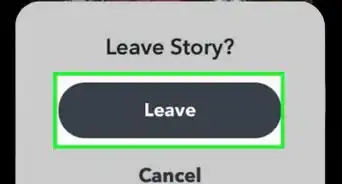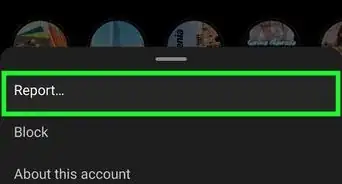wikiHow is a “wiki,” similar to Wikipedia, which means that many of our articles are co-written by multiple authors. To create this article, volunteer authors worked to edit and improve it over time.
This article has been viewed 40,078 times.
Learn more...
Are you not allowed on social media? Maybe you believe you're old enough, even though your parents currently disagree. Many teenagers are restricted from social media, normally for a variety of reasons. For example, some teens have access cut after their parents catch them misusing social media, while others may have parents who are just concerned for their teen's safety. Nevertheless, social media is a way to express yourself, your opinion, and a way to communicate with your friends, so it's understandable why you might want to convince your parents to let you get your own social media accounts.
Things You Should Know
- You'll need to be 13 or older to use most social media platforms. If you're not 13 yet, you might be able to sign up with your parents' help.
- Explain how the app works and it will benefit you. Some parents don't get that social media can be educational!
- If they say no, don't argue. Instead, take on extra tasks to show that you're responsible, such as taking care of pets and household chores.
Steps
Before You Ask
-
1Make sure you're old enough. Most, if not, all, social media platforms require users to be over the age of 13, in compliance with COPPA (Children's Online Privacy Protection Act).[1] .
- If you're under 13, some platforms will still allow you to sign up, but with parental consent. Sometimes, they may require you to fill a COPPA form out.
- While wikiHow is not a social media website, it's one example of a site that maintains an age rule in compliance with the COPPA.
-
2Figure out which platform you'll be using. This is important, as your parents may want to know. Sometimes, parents will already know the terms of use and the typical behavior of users if they've used the platform before. It would likely be best to start with asking for access to one or two platforms so that you can later show to your parent(s) that you are responsible enough to manage multiple.
- Make sure to research the terms of use and privacy policy, along with any other policies associated with the platform you wish to use.
- Some common social media apps are Instagram, Twitter, Facebook, Snapchat, and yes, even YouTube. Most of these apps are used for sharing pictures, videos, statuses, and more - hence the name 'social media'.
- Instagram is used for sharing pictures and videos, as well as keeping in touch with friends or other distant family members.
- Facebook, much like Instagram, is used to share pictures and videos, and to communicate with friends or family. However, Facebook can be used to share statuses (specifically).
- Twitter is similar to Facebook. It's used to mainly speak what's on your mind. It's been used to do a lot of good. Also, multiple news sources, police departments, fire departments, etc. use Twitter (and Facebook) to communicate with their communities.
- Snapchat is designed, and used, to talk to people directly. This means instant messaging. It's still used to share what's on your mind with the story feature.
- YouTube is primarily for videos. There is no instant messaging feature.
Advertisement -
3Figure out what you'll say. Try to think beforehand what you'll talk to them about. Figure out if you'll start simple or more oversimplified. Try not to say too much, because you want to make sure your parents are listening. Saying 'too much' could mean giving too much information to retain, telling your parent(s) about certain features too early on, etc.
- Try to start off talking about the topic of social media, eventually touching on the subject of having access to it. Again, try not to say too much. Just simply have a conversation about restrictions to certain social media platforms. From here, you can ask and begin to explain further information (explained below).
Asking for Permission
-
1Find an appropriate time. You wouldn't want to ask when something bad has happened or if they're preoccupied. Try to approach them when they aren't already doing something, as this will make things much simpler. You could try to approach them when:
- It's a relaxing day/weekend
- You've accomplished something good that demonstrates responsibility (e.g., getting a good grade on an exam)
- In the car
- Discussing the topic of social media
-
2Explain the platform to them. A lot of parents may deny access to social media because they don't know how to use it or its purpose. Show them the benefits of having an account, the point behind the platform, etc.
- When explaining the benefits, talk to them about your friends, and how you could use social media to communicate with them. If you have some sort of interest in photography, videography, cinematography, etc. show them other features that could help you get started in that field (such as filters for color correction, blurriness, and other features associated with filters.)
- Make sure to explain some of the other functions, such as blocking, commenting freely, etc.
-
3Expose them to the features of the platform. Most teens may avoid this, as it opens the gate for a parent to restrict many features on the program. Avoiding this part could be worse for your case, especially if you have strict parents.
- If you are hesitant on this step, try to explain that you're trustworthy. Bring up past events where you were honest or doing the right thing.
- Starting out with restricted access to a social media platform can be better than nothing, and those restrictions may not be permanent. If your parents allow you restricted access to a certain platform, they may eventually loosen those restrictions if you can prove that you're using your account safely and responsibly.
-
4Converse instead of arguing. Arguing may persuade your parents against letting you have access to social media. If you start off by arguing about it, some parents may even think getting social media may cause you to become even more argumentative. Discuss the issue with them in a calm and collective manner, ensuring you get your point out there without seeming disrespectful.
- Try to keep eye contact as frequently as possible.
- Listen to what they have to say. They may have some important points that you may form a rebuttal about.
- Tell them that you understand any dangers and/or risks associated with social media, and that you can avoid those, or that you'll try to avoid those to your best ability.
Handling Rejection
-
1Stay calm. As aforementioned, arguing back or getting mad can cause the answer to remain a firm "No". Try to reason with your parents, but do so calmly.
- If they make an unfair point, or a point that is clearly solvable through the application, try to explain things further.
- Explain that you want to use social media to also talk to friends, classmates, and relatives whose phone numbers you do not have.
-
2Show that you're responsible. Do chores around the house, take better care of your household pets (if you have them), help with the cooking (if allowed to do so), etc. Your parents may realize that you would be responsible enough to manage an online account responsibly.
-
3Ask again after time passes. You should attempt to ask again after a few weeks. This should, however, be after you've shown some sort of responsibility. Your parents will keep it at a "no" if you don't show them that you can be responsible.
-
4Volunteer to share your account information with your parents. They may have more of a sense of protection if they have the correct information to your account. Oftentimes, they just want to make sure you're safe or doing the right thing.
- At a minimum, you should consider sharing your public page with your parents. Having the ability to check on what you're posting will usually help your parents know you're not trying to hide anything bad from them.
- It's fine if you don't want to share your login information with your parents, as many teens don't. If you agree to do so, though, don't change the information without telling your parents since they could believe you're trying to deceive or hide something from them.
Community Q&A
-
QuestionI am 13 and my parents say that I should be around 15-16 years old to start an account, though they have given me the opportunity to write an essay proving my point. I need some ideas on what to say.
 AuthenticityCommunity AnswerProve that you're mature enough. Bring back incidents where you were able to do certain tasks that other 13-year-olds wouldn't be able to do. You can also cite that many kids you age, including your friends, use social media to talk and share their thoughts. You could also take a hobby of yours and explain how certain social media applications can help fuel your ambitions with that hobby.
AuthenticityCommunity AnswerProve that you're mature enough. Bring back incidents where you were able to do certain tasks that other 13-year-olds wouldn't be able to do. You can also cite that many kids you age, including your friends, use social media to talk and share their thoughts. You could also take a hobby of yours and explain how certain social media applications can help fuel your ambitions with that hobby. -
QuestionI am 12 and in 7th grade and ever since 5th grade all my friends got social media and I don't have any other than YouTube that I only use for school and podcast. What do I do to let me get social media?
 AuthenticityCommunity AnswerExplain to your parents that you believe you're old enough and mature enough. Maybe emphasize how you may feel left out because you are restricted from social media.
AuthenticityCommunity AnswerExplain to your parents that you believe you're old enough and mature enough. Maybe emphasize how you may feel left out because you are restricted from social media. -
QuestionMy parents say that I am too young to have any social media site because of the unsafe people and my age. How can I persuade them to let me have one?
 AuthenticityCommunity AnswerWell, try to prove to them that you're mature enough for a social media account. Show them some ways they can keep you protected.
AuthenticityCommunity AnswerWell, try to prove to them that you're mature enough for a social media account. Show them some ways they can keep you protected.




































































